Cholesterol and Erectile Dysfunction: Link, Causes, Treatment and Diet
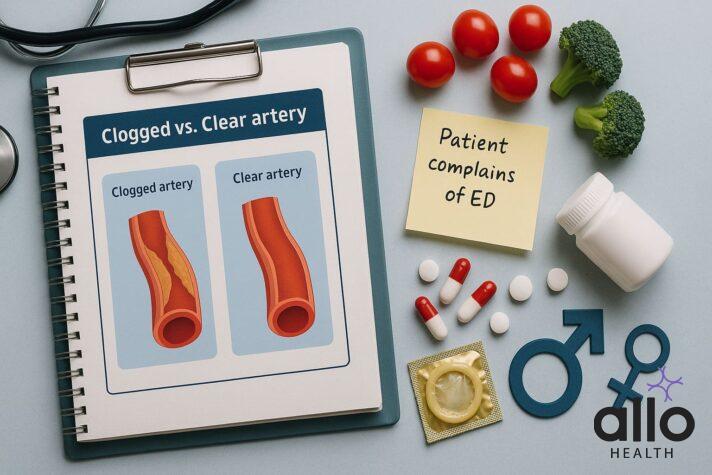
Cholesterol and erectile dysfunction are indeed connected. High cholesterol directly causes erectile dysfunction by blocking blood vessels with plaque buildup, reducing blood flow to the penis, impairing the body's ability to produce nitric oxide needed for proper erections and lowering testosterone production. The good news is that this type of ED is often reversible. A combination of lifestyle changes, a heart-healthy diet, and the right medications, including statins and PDE5 inhibitors, can significantly improve both cholesterol levels and erectile function. While some cholesterol medications may cause sexual side effects in a few individuals, most are safe and beneficial when used under proper guidance.
Does high cholesterol affect your sex life? Many see cholesterol as just a heart problem, but it affects more than that. It can also impact your erections. High cholesterol can block blood flow, harm blood vessels, and affect hormone production. All these factors are crucial for healthy sexual function.
In this article, we’ll break down exactly how cholesterol and erectile dysfunction are connected, exploring the science behind it. You’ll learn how certain medications may help, or can cholesterol medicine cause ED, and what practical changes you can make to support both your heart and your erections.
Can High Cholesterol Cause Erectile Dysfunction?
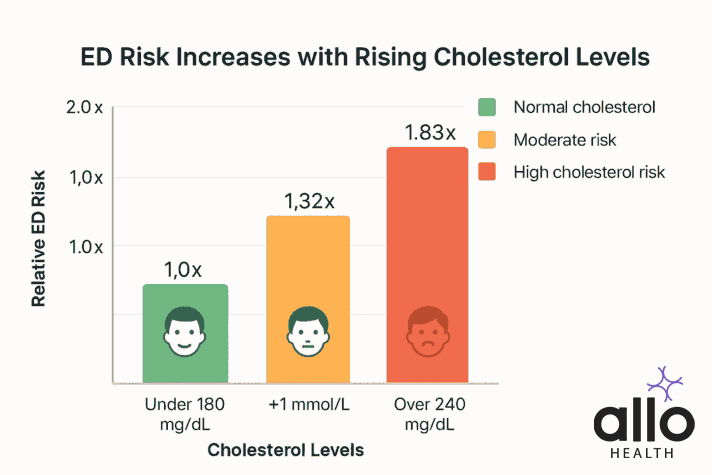
Cholesterol is a waxy, fat-like substance found in the body and in many of the foods that we eat. The body needs cholesterol to build healthy cells, make hormones, and produce vitamin D.
But when cholesterol levels rise too high, especially the “bad” type, it can cause problems. There are two types of cholesterol:
LDL cholesterol (Low-Density Lipoproteins): This is called “bad” cholesterol. High levels of LDL can cause plaque to build up in blood vessels.
HDL Cholesterol (High-Density Lipoprotein): This is the “good” cholesterol. It helps remove and transport cholesterol from the blood to the liver for disposal.
Research shows a strong link between cholesterol and erectile dysfunction. High cholesterol levels can harm erectile function in several ways.
In fact, studies[1] have shown that for every 1 mmol/L increase in total cholesterol, a man’s risk of developing ED goes up by 1.32 times. If the total cholesterol exceeds 240 mg/dL, the likelihood of experiencing ED is almost 1.8 times greater than for someone with levels below 180 mg/dL.
Based on clinical data from over 250,000+ consultations at Allo Health, 43% of men diagnosed with erectile dysfunction were also found to have elevated cholesterol levels without previously knowing it.
Let’s try to understand how does high cholesterol cause erectile dysfunction in detail. The Cholesterol and Erectile Dysfunction Connection
Arterial Blockage and Blood Flow
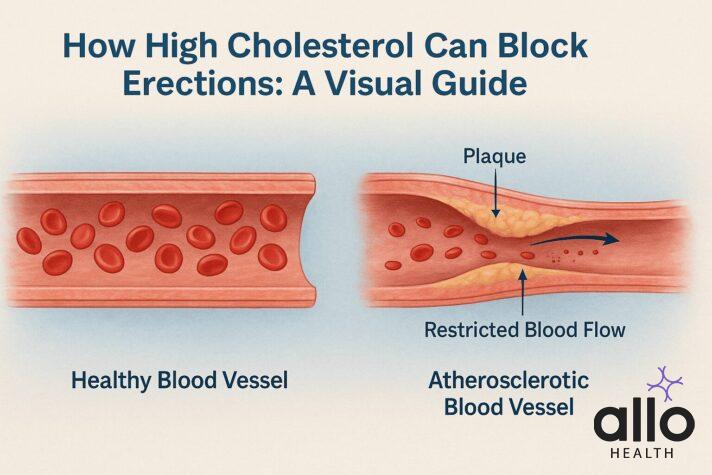
High cholesterol leads to erectile dysfunction mainly by forming plaques (atherosclerotic plaques) in the blood vessels.
A high level of LDL cholesterol in the body can cause it to stick to the walls of the blood vessels. Over time, it forms a plaque on the blood vessel wall, leading to the narrowing of the blood vessel, a condition known as atherosclerosis.
This blockage causes a reduced blood flow throughout the body including to the penis, where a good blood flow is very important for erectile function. Thus, atherosclerosis caused by high cholesterol levels directly causes erectile dysfunction.
Endothelial Dysfunction
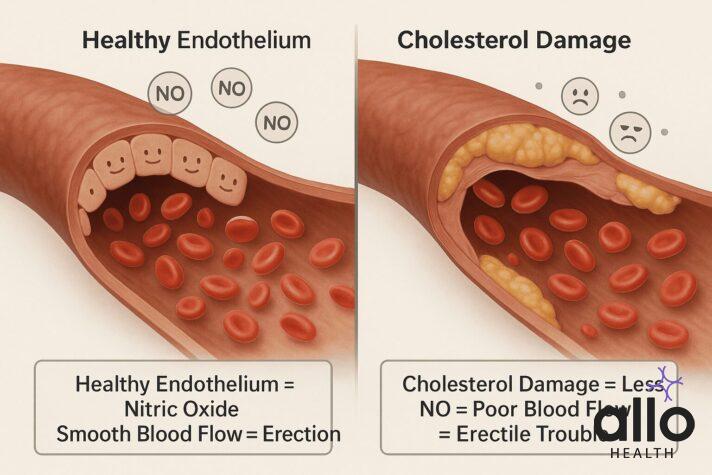
High cholesterol doesn’t just block blood vessels; it also damages the inner lining of the blood vessels, called the endothelium. This damage, called endothelial dysfunction, lowers the body’s ability to make nitric oxide. This chemical is important because it helps blood vessels relax and widen.
High cholesterol can disrupt this process. When that happens, penile blood vessels struggle to dilate during arousal. This makes it difficult to achieve and maintain an erection.
Hormonal Impact
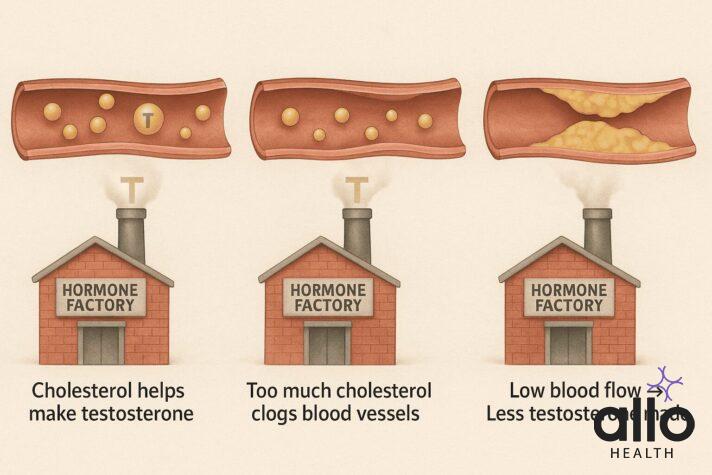
The body needs cholesterol as a building block to produce testosterone in the testicles. Testosterone is crucial for sexual desire, performance, and sexual health.
But here’s the catch: when cholesterol levels get too high, the resulting plaque buildup can reduce blood flow to your testicles. Poor blood flow affects testicle function. This can result in lower testosterone production.
This creates a tricky situation. Cholesterol helps make hormones, but too much can harm the organs that produce them. This damage can lower hormone levels.
In fact, ED was the first noticeable symptom in more than 1 in 4 men later diagnosed with high LDL cholesterol, as observed in our clinical consultations at Allo Health.
Other Shared Causes & Risk Factors
While high cholesterol contributes directly to erectile dysfunction, it’s important to know that it often coexists with other risk factors that can worsen the problem.
- Diabetes and High Blood Pressure often go hand-in-hand with high cholesterol. Diabetes harms blood vessels and nerves that help with erections. High blood pressure makes cholesterol-damaged arteries weaker and raises the risk of heart disease.
- Obesity: Excess weight, especially around the belly, leads to hormonal imbalances, including lower testosterone levels. It also worsens blood circulation and often drives up cholesterol levels.
- Lifestyle Factors: Smoking harms blood vessel walls. This makes them more prone to cholesterol buildup and also reduces blood flow. Excessive drinking affects the liver’s ability to process cholesterol and can mess with the nervous system. A diet high in saturated fats feeds the cholesterol problem, while a lack of exercise weakens the cardiovascular system overall.
- Stress and Mental Health: Long-term stress releases hormones, like cortisol. These hormones can harm blood vessels and reduce their ability to expand. Depression and anxiety can lower libido and lead to unhealthy coping mechanisms like poor eating, smoking, or drinking. Plus, some antidepressants can directly impact erectile function.
- Age and Genetics: As we age, metabolism slows. Cholesterol levels often rise, and blood vessels lose flexibility. Some men have a genetic risk for high cholesterol or heart disease as they get older. This can happen no matter how they live.
We often think of cholesterol as just a heart issue, but it can affect blood flow everywhere, including to the penis. For many men, erectile dysfunction is the first sign that something deeper, like high cholesterol, is going on.
How to Treat ED Linked to High Cholesterol
a) Lifestyle Modifications
- Exercising for at least 45 minutes three times a week can help reverse mild ED. Also, resistance training can boost cholesterol levels.
- Brisk walking, cycling, and swimming are great for lowering LDL cholesterol. They also help improve blood flow in the body.
- Quitting smoking, moderating alcohol consumption, and managing sleep and stress is also important.
b) Diet Modifications
- Heart-healthy dietary changes can significantly improve both cholesterol levels and erectile function:
- Eating a Mediterranean diet full of fruits, vegetables, fish, and nuts can help reduce ED symptoms.
- Increased soluble fiber intake (over 10g daily) can lower LDL cholesterol levels.
- Reduced saturated fat consumption helps to prevent arterial plaque formation.
- Avoiding processed and fried foods supports better circulation
c) Medications
Statins: Statins are the go-to cholesterol-lowering medications, but they may also help with erectile function. By reducing cholesterol and improving blood vessel health, statins can enhance blood flow to all parts of the body, including to the penis. Some studies suggest that men taking statins may see improvements in their erectile function over time as their vascular health improves.
PDE5 Inhibitors: Medications like Viagra, Cialis, and Levitra are used for treating ED. They work by improving blood flow to the penis during arousal. The good news? They’re generally safe to use alongside statins.
Combination Therapy
For men with high cholesterol and ED, combination approaches often work best. Statins help control cholesterol and may also improve erectile function. PDE5 inhibitors, like sildenafil and tadalafil, directly treat ED.
Among men who started cholesterol-lowering treatment combined with lifestyle changes, 72% saw a noticeable improvement in erectile function within six months, based on internal outcome data from Allo Health.
Can Cholesterol Medicine Cause ED?
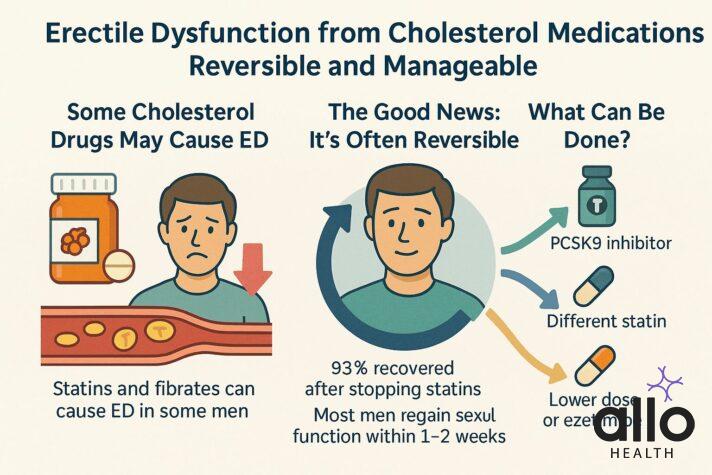
Does cholesterol medicine cause ED? Cholesterol-lowering medications can support erectile health by improving blood flow. But some studies say it may also contribute to erectile dysfunction in certain individuals. The effects vary by drug type.
Statins:
Statins are the most commonly prescribed cholesterol drugs. While many studies[2] show they improve erectile function by improving heart health, some reports link specific statins to ED.
- Rosuvastatin shows the highest risk (adjusted odds ratio 7.1)
- Atorvastatin and simvastatin have also been associated with ED in some cases
- Around 57% of men reported recovery after stopping the medication
Other Lipid-Lowering Agents
|
Medication Class |
Association with ED |
Notes |
|---|---|---|
|
Fibrates |
Reported cases of ED |
Gemfibrozil and fenofibrate have been linked to ED in some patients |
|
PCSK9 Inhibitors |
Rarely associated with ED |
Some evidence suggests they may improve sexual function |
|
Ezetimibe |
Rarely associated with ED |
Limited data; generally not linked to ED |
|
Bile Acid Sequestrants |
Not significantly linked to ED |
No strong evidence of sexual side effects |
Why This Might Occur:
While statins are effective at lowering cholesterol, they also block an enzyme called HMG-CoA reductase[3], which plays a key role not just in cholesterol production but also in the body’s ability to produce testosterone.
Some studies have found that statin use may reduce both total and free testosterone levels, which might explain these side effects in some individuals.
The Good News:
For most men, any sexual side effects from statins are temporary and often disappear as the body gets used to the medication. The long-term benefits of healthier cholesterol levels and better blood flow usually far outweigh these early bumps.
What You Should Do:
Some research[4] shows that statins may actually help with erections, especially in men with high cholesterol or heart problems. This is because statins can improve blood flow by making blood vessels work better and helping the body produce more nitric oxide, which is important for getting an erection.
But the effect of statins isn’t the same for everyone. For some men, statins improve sexual function, while for others, they may cause or worsen erectile dysfunction. That’s why it’s important to talk to a doctor if you notice any changes after starting the medication.
If you notice changes in sexual function after starting cholesterol medication, don’t stop taking it on your own. Talk to your doctor- they can adjust your dosage, switch you to a different statin, or address the issue while keeping your cholesterol treatment on track.
Diet for Lowering Cholesterol and Supporting Sexual Health
You do not need to completely overhaul your diet overnight. Start with small, sustainable changes. Your body will reward you with better cholesterol levels and improved sexual health.
Heart-Healthy Indian Diet: The Mediterranean[5] diet is the gold standard for heart and sexual health, but you can give it an Indian twist too. The secret is smart swaps: use olive oil or mustard oil instead of too much ghee. Add more fish and dal. Fill your plate with vegetables. Choose whole grains like brown rice and millets.
Whole Grains: Brown rice, millets (like ragi, bajra, and jowar), oats, and barley lower cholesterol. They also give you long-lasting energy.
Legumes & Proteins: Dal (masoor, moong, toor), mackerel, sardines, lean chicken, and eggs offer heart-healthy protein. Fish is particularly beneficial for its omega-3 fatty acids.
Vegetables & Fruits: Leafy greens like spinach and methi, tomatoes, bell peppers, and pomegranates give antioxidants. These antioxidants help protect blood vessels. These foods are rich in nitrates that support healthy circulation.
Healthy Fats: Nuts like almonds and walnuts, seeds such as flaxseeds and pumpkin seeds, and olive oil give us good fats. These fats help with hormone production and cholesterol management.
Spices & Herbs: Turmeric, garlic, ginger, and coriander do more than add flavour. They provide protection for blood vessels, reduce inflammation, and enhance circulation.
Key Takeaway
Cholesterol is a double-edged sword, essential in small amounts, but harmful in excess. Does high cholesterol cause erectile dysfunction? Yes, high cholesterol can cause erectile dysfunction by damaging blood vessels, reducing blood flow, and lowering testosterone production. It doesn’t just impact your heart; it affects your sexual health too.
The good news? You’re in control. A heart-healthy lifestyle and balanced diet can go a long way in protecting both your overall and sexual well-being.
If you are noticing difficulty in erectile function, getting your cholesterol levels checked can be a smart move. High cholesterol often goes unnoticed until it causes serious problems, and ED can be an early red flag. Catching it early helps you take charge of your cardiovascular health, sexual health, and overall well-being.
"The following blog article provides general information and insights on various topics. However, it is important to note that the information presented is not intended as professional advice in any specific field or area. The content of this blog is for general educational and informational purposes only.
Book consultation
The content should not be interpreted as endorsement, recommendation, or guarantee of any product, service, or information mentioned. Readers are solely responsible for the decisions and actions they take based on the information provided in this blog. It is essential to exercise individual judgment, critical thinking, and personal responsibility when applying or implementing any information or suggestions discussed in the blog."






